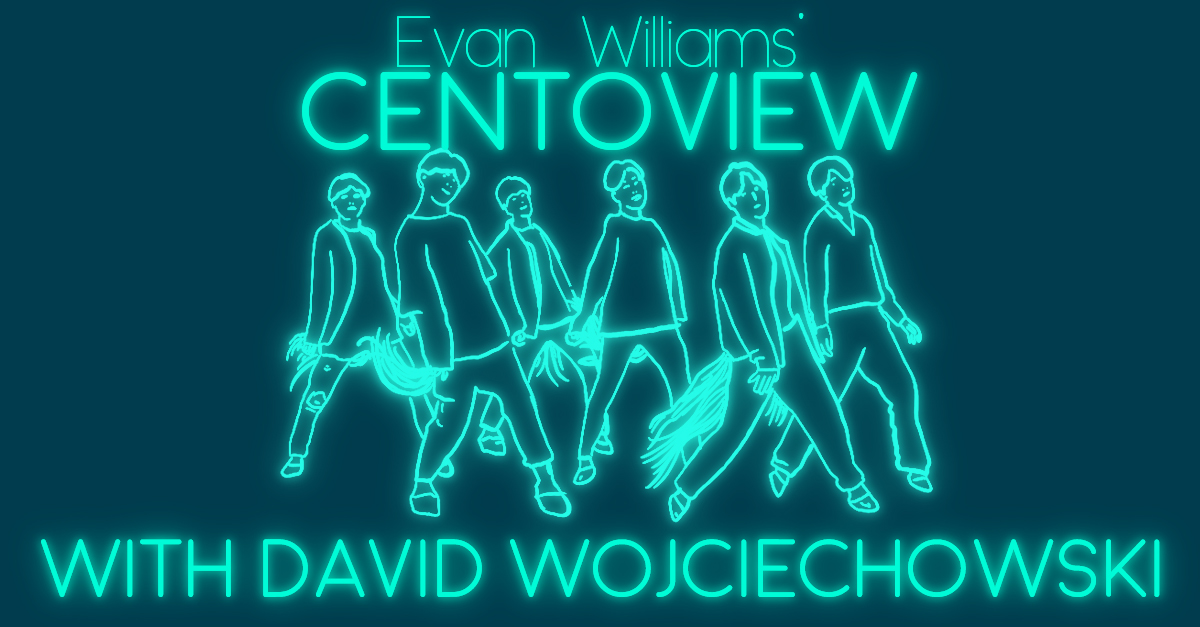Some months ago, I had the idea for an interview series in which artists across disciplines would answer simple questions by cobbling together portions of answers given by other artists in interviews. The hope was to encourage artists to define their work by and against the philosophies of their influences.
The result is less an interview and more a collection of manifesto-type cento poems. One future participant called them centoviews, which I’ve grown to like.
When I was building my list of people I’d like to have in this series, David Wojciechowski came immediately to mind. A multidisciplinary artist, David is the author of the excellent Dreams I Never Told You & Letters I Never Sent, and is responsible for design at Split/Lip Press, Pleiades Press, and Salt Hill. In his spare time, he makes robots, which are likely sentient—consider for a moment, October Bot. Above all else, David is a boundlessly generous writer ever-engaged with and elevating the work around him (see his exquisite reading series, for example).
In his poem No Clear Water in Those Eyes, David writes:
“I could break into a million pieces. I could be a lumberjack. I could plant trees. I could be a tree shepherd. A wolf in trees’ clothing. Bark for skin. Peeling off layers to the center. Writing on myself or building a house out of myself or perhaps throwing myself into a fire to keep me warm—oh the wonderful things I could do to me if I were a tree.”
We have all built ourselves from a million pieces, and we can, at any moment, throw off or add portions of ourselves and reassemble. These interviews are a way for artists to take inventory.
What are your million pieces? How do they stack?
Drawing on Louise Bouregois, George Condo, Rose English, Anne Hardy, Hew Locke, Lucy McKenzie, Cornelia Parker, Heather Phillipson, Kiki Smith, Mark Whalen, and Anicka Yi, here is a conversation with David Wojciechowski.
- Please define your discipline/form/genre as you see fit.
Like the sea, you have these eddies and corners were things get stuck and get left or the tide goes out and things are left there. Our minds go into the boats and we imagine a journey we might take on them.
- What do you think about most often?
There’s a film by Charlie Chaplin called Modern Times when he’s working in a factory, he puts his boss’s jacket on this hydraulic press and the press comes down and squashes the jacket. There’s this giant fob watch, it’s like four times as big as it should be and that was when I thought, I want to crush things.
- How much a part of you is your creative work, and how much a part of it are you?
When you make a piece of work you see things one way, and the piece of work has a life of its own. The way it’s made just kind of disappears. And it’s not only this but also this and this and this. I follow it.
- What’s a dream you’ve never told anyone?
Six dancers dressed in horse hooves and tails. They performed in a dressage arena. The horses perform in a synchronized display. I see the horses rest together. As if communicating some deep meaning. The organizer refuses to let the event go ahead. I thought the world would understand. But no.
- What’s a letter someone never sent you?
I’m actively tapped into the world around me and I’m thinking about some of the bigger questions. I have been influenced by microbiology and a lot of A.I. research. I wanted to create an aquarium of machines. That’s what makes me tick. The fate of the work is to be destroyed. It is really what I want.
- If the Incredible Hulk spoke at your funeral, what would you hope he would say?
This will be like the sleeping bus driver. Like you’re walking through the forest. You don’t really know where you’re going and you just start from some point and randomly travel until you get to a place where you finally reach your destination. The way a performer plays a violin, you’re free to become anything.
- What do you have in your life right now that you most hope that future David has hung onto?
Follow your work as truthfully as you can even when it brings you into ditches, rather than holding an idea of how you want it to be—rather than trying to manipulate your life to be a particular way, that your life just unfold itself.

